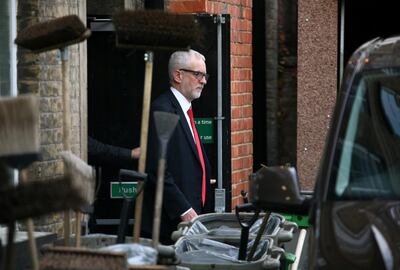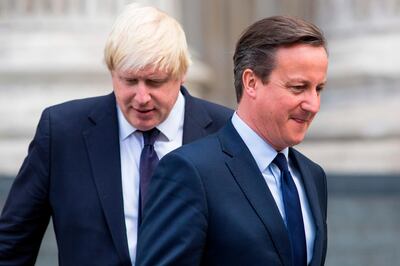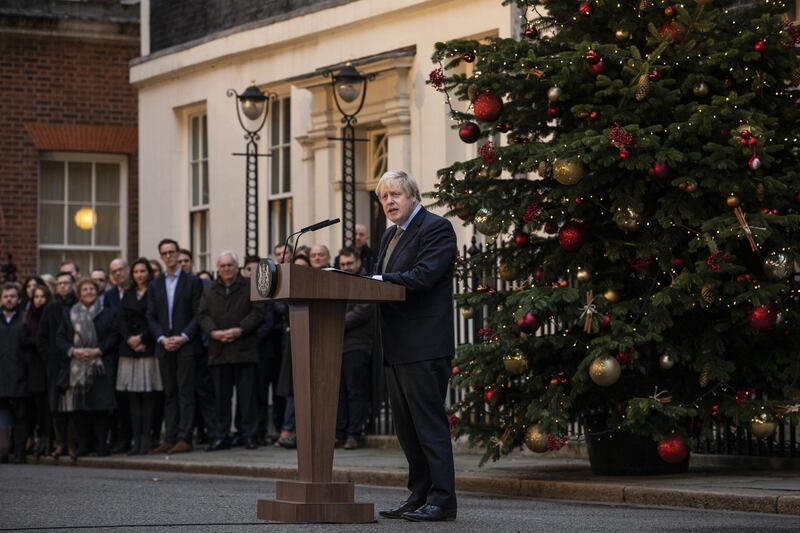The era of post-Brexit Britain dawned when last week's election delivered a big majority for Boris Johnson. The country can now be said to have reached the end of the beginning of its transformation from a member of the European Union into an independent player.
The most important aspect of the election was that it delivered a clear and durable mandate. This means that the UK can now define its place clearly in international affairs, making choices where it has recently hedged its bets. In tandem with efforts to reshape the economy, the implications are likely to resonate far beyond the Westminster bubble.
In a victory speech that will rank with those made by Margaret Thatcher in 1979 and Tony Blair in 1997, Boris Johnson gave a careful promise on Friday to those who were “lending” their votes that his people’s government would meet their expectations. Mrs Thatcher ushered in a time of opportunity by promising to replace despair with hope. Mr Blair offered the idea that things could only get better.
Mr Johnson has weathered a political crisis that has been both all-absorbing and immobilising. Now he and his ministers have an opportunity to make a new impact on the world. A government that is almost certain to stay in power for at least five years will inevitably attract foreign interest in longer-term and deeper engagement.
As Britain is coming out the EU single market, its opportunities to strike new trade and investment deals from states far and moving from tentative to tangible.
The removal of Jeremy Corbyn, the leader of the opposition Labour party, as a clear and future danger will just by itself make a difference. While governments around the world had drawn plans to engage constructively with Mr Corbyn, there is no doubt that his track record and world view were vastly different from those of any British prime minister in recent history.
It is true that governments act differently and respond to a different set of considerations that the positioning adopted by opposition leaders. With Mr Corbyn, there was set of factors that was going to reset Britain’s ties with many of its closest allies. In his ties to outfits like Black September, Hamas, Hezbollah and the IRA, Mr Corbyn had spent a lifetime indulging an alternative worldview.

By contrast, Mr Johnson presents continuity with the long-established policy positions held by the UK.
After a decade of undeniable drift, there is a tantalising potential for a fresh start. The prime minister was foreign secretary until June last year and forged a valuable bank of friendships with leading officials abroad. The appointment did not result in a lasting legacy. His tenure was, however, a factor in the recent election. It especially provided some political positioning around issues of conservation and empowerment of girls through education.
More instructive is the goodwill Mr Johnson garnered as an open, internationalist mayor of London. People still fondly remember how Mr Johnson would describe London as "the eighth emirate of the UAE". During his tenure, which ended a little less than four years ago, the British capital was open for business, and a great deal of investment flooded east and west.
Calls to get Mr Johnson on the phone from foreign leaders were being booked by officials before midnight on Thursday. As a permanent member of the UN Security Council, Britain remains a compelling actor despite its declining appetite to take a strong stance on a gamut of international issues.
Mr Johnson's forceful personality represents a gear change in leadership. The preferred style of governance of the prime minister is as a chairman of the board. By liaising with his peers and giving direction to his executive officers, Mr Johnson seeks to impart energy and direction to his administration. The classical scholar and biographer knows the perils of getting bogged down in detail. Drawn out and agonising tussles with weighing alternative courses of action are not his thing. As a man of action, Mr Johnson is fortunate that there is plenty of thinking on how to reinvent Britain's global role draw on.
The advantage of a strong position in parliament is that he has a freer hand to pursue a swift and rapid overhaul of a now malfunctioning system.
The Conservative party's majority will almost certainly unleash much of the pent-up appetite for change in foreign policy within the party. There is a widespread feeling that Britain has lost much of the last decade in introspection. A former aide to former prime minister David Cameron declared last week that London had pulled in its horns after the rejection of the strikes on Syria by the House of Commons in 2013.

On the cards already is a plan to reinvigorate the foreign office by putting development spending back under the overall purview of the diplomatic service.
Getting Brexit done is a one-off opportunity to change how the government broadly conducts its international relationships. A wider shake-up is likely on leaving the EU. Post-election expectations centre on the department of international trade being rolled into a super-ministry that both deals with leaving the EU with a new association as well as forging new trade deals.
Clarity on all sides starts with clear messaging to partners about where Britain is headed. Achieving the consensus of partnership cannot be a matter of accidental innovation or slavish following of precedent.
At the heart of what the reformers need to achieve is to maintain and build on Britain's global role as part of the process of leaving the bloc. It is important to revamp how the machine functions. This cannot be sufficient. Equally, better definitions of what Britain is trying to do is vital.
Brexit is not an event in isolation. Embedding that lesson in foreign policy could be asset. So too is adopting new means of assessing how the country deals with an era of increasing global competition. A shift to becoming a more effective player in the Indo-Pacific and the Arctic is sorely needed. A focus on protecting and extending the country’s influence must render real gains for the UK. More resources should be directed towards defence and new strategic technologies, including space. A process of assessment of British interests must sit at the heart of daily government in the way that has not been possible so far.
Freed from the distractions of day-to-day survival, British leaders can be more effective. Michael Fallon, the former defence secretary, lamented recently that during his time in office he would receive reports of his French counterpart travelling to conferences and forum meetings. Mr Fallon could only look on frustrated from London, where he was stuck in the parliamentary lobby defending a non-existing parliamentary majority.
A more compelling case should also emerge for the UK as a revitalised economic partner. At a time of low interest rates, Mr Johnson's government is set to splurge to raise investment levels. Big signature projects and a larger than life political leader can be expected to draw massive foreign interest.
The effect on diplomatic and political ties should not be underestimated.
Damien McElroy is the London bureau chief for The National






